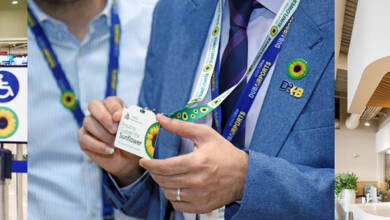What UAE schools will look like when campuses reopen
Schools will need to prepare for scenarios in case of an infection or a potential outbreak
UAE schools will look vastly different when they bring pupils back to the campus, education experts have said.
Children will walk into school premises wearing face masks. They will get their temperature checked before the morning attendance, play contact-free sports, and will sit metres away from their peers.
Schools in the UAE are scheduled to open on August 30, but there is no confirmation yet on whether remote learning will continue into the next academic year.
Schools may follow a hybrid model, a mix of online and on-campus classes, as educators and policymakers try to determine what classrooms should look like during the pandemic.
The National spoke with experts to help parents understand and assess what they can expect when their children return to school.
Frequent hand-washing but no friendly hugs or sharing food
Strict precautionary measures will need to be in place if schools bring pupils back to the campus.
“Children won’t be able to sit with 30 of their classmates and will not be sharing food in the canteen,” said Maya El Hachem, managing director and partner at Boston Consulting Group, a global management consulting firm. “They will be interacting differently, playing differently, and will be asked to wash their hands very frequently.”
Tony Elzoghbi, board executive at Kent College in Dubai, said schools across the country are waiting for the official direction to plan activities for the next academic year.
“If pupils want to play contact sports, that may not be possible,” he said.
“We have to see what the authorities will allow. We will follow their policies.
“There is no clarity yet but we do expect to soon hear from the authorities.”
If pupils are required to stay a few metres apart, schools may encourage children to engage in performing arts or act in plays.
Schools may opt for sports in which people can stay away from each other such as badminton, tennis and athletics instead of football and cricket.
Educators will also have to revise their schedules, and while parent-teacher meetings may be held virtually, it may be a while before children can engage in after-school activities.
Health and safety precautions will be increased with schools investing in fumigation, germicidal lamps, and thermal scanners.
“When schools reopen, we will have a very strong emphasis on preventive measures and social distancing,” said Dr Leila Hoteit, managing director and head of education at BCG.
“If you want people to go back to work and they are caregivers, then you will have to send children back to school.
“Everything in the school that goes beyond the classroom and teaching will have to be transformed digitally.”
Wellbeing of pupils will be a priority
The emotional wellbeing and mental health of pupils will be extremely important when schools reopen as pupils have been studying at home for months with no social interaction.
Pupils’ emotional and social needs will be brought to the fore and personalised education will take a stronger role in the future of education.
“Having the children at home and asking them to wear masks is disturbing for them. They are used to playing together and sharing,” said Mr Elzoghbi.
“They will see their best friends but unfortunately will not even be able to hug them. This will have a big impact on them when they return.”
The whole pupil journey will have to be re-imagined by the authorities, said BCG’s El Hachem.
“They will also have to think about the wellbeing of pupils who have been confined for many months and have not interacted with their peers.
“Children love to sit down next to each other. With social distancing being part of the new norm, this will be difficult for them.”
Ms El Hachem, who advises schools as well as governments in the Middle East on education, said schools will have to plan financially to understand how many pupils may be able to attend a class at any given time and how many teachers would be needed.
In case of an outbreak
Schools will need to train staff with a focus on the roles of nurses and counsellors while also preparing for scenarios in case of an infection or a potential outbreak.
In South Korea, more than 200 schools were forced to close again last month, days after they had opened, due to an increase in the number of coronavirus cases.
Sir Christopher Stone, global chief education officer at Gems Education, said fallback procedures would be in place at schools in case there is a surge in cases.
“We believe that it would be safe to go back to school. However, if that changes, just like it did in South Korea, then we would not want our children to be placed in that position and we would follow guidelines,” he said.
Schools would then consider other approaches such as blended learning, or pupils attending school in batches or at different times.
Dr Hoteit said parents would be monitoring whether schools will be opening in their home countries to make decisions on whether they should return home.
“Every country in the world is going through this dance where they open [the economy] and look at how virus is, then decide if they want to open up,” she said.
“The government will be looking to benchmark what other countries are doing across the globe, especially if most of the countries have opened schools.”
Last month, four out of five teachers around the globe said it is not yet safe to return to the school, according to a poll of more than 4,000 teachers from 33 countries carried out by T4 conference, one of the world’s largest education conferences.
According to Oliver Wyman, a management consulting firm, which has published the report Re-opening Schools Post Covid-19, institutes in the Middle East will need to have a strategically phased approach to opening up including a pre-opening, opening and post-opening framework.
During these phases, schools would need to implement increased temperature checks at entry, enhanced sterilisation and cleaning processes, along with limiting the interaction between pupils.
“With the region facing growing macroeconomic uncertainty, a staged approach to reopening schools after Covid-19 will allow policymakers and academic institutions to address the long-term implications of prolonged school and university closures,” said Jeff Youssef, partner at Oliver Wyman.
“Schools remain critical as they are linked to parents rejoining the workforce and contributing to [or even remaining in] the economy.”




